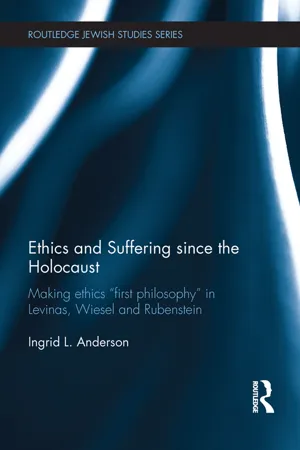
Ethics and Suffering since the Holocaust
Making Ethics "First Philosophy" in Levinas, Wiesel and Rubenstein
- 186 pages
- English
- ePUB (mobile friendly)
- Available on iOS & Android
Ethics and Suffering since the Holocaust
Making Ethics "First Philosophy" in Levinas, Wiesel and Rubenstein
About This Book
For many, the Holocaust made thinking about ethics in traditional ways impossible. It called into question the predominance of speculative ontology in Western thought, and left many arguing that Western political, cultural and philosophical inattention to universal ethics were both a cause and an effect of European civilization's collapse in the twentieth century.
Emmanuel Levinas, Elie Wiesel and Richard Rubenstein respond to this problem by insisting that ethics must be Western thought's first concern. Unlike previous thinkers, they locate humanity's source of universal ethical obligation in the temporal world of experience, where human suffering, rather than metaphysics, provides the ground for ethical engagement. All three thinkers contend that Judaism's key lesson is that our fellow human is our responsibility, and use Judaism to develop a contemporary ethics that could operate with or without God. Ethics and Suffering since the Holocaust explores selected works of Levinas, Wiesel, and Rubenstein for practical applications of their ethics, analyzing the role of suffering and examining the use each thinker makes of Jewish sources and the advantages and disadvantages of this use. Finally, it suggests how the work of Jewish thinkers living in the wake of the Holocaust can be of unique value to those interested in the problem of ethics in the twentieth and twenty-first centuries.
Presenting a thorough investigation of the work of Levinas, Wiesel and Rubinstein, this book is of key interest to students and scholars of Jewish studies, as well as Jewish ethics and philosophy.
Frequently asked questions
Information
Table of contents
- Cover
- Half Title
- Title Page
- Copyright Page
- Dedication
- Table of Contents
- Introduction
- 1 Philosophical ethics in inter-war Europe: the 1929 Davos disputation and anti-(neo) Kantian backlash
- 2 The call of the Other: Levinasian ethics
- 3 In spite of Man: the ethics of Elie Wiesel
- 4 “There is nothing final about the death of God”: Richard Rubenstein’s post-Holocaust ethics
- 5 Toward an ethics grounded in suffering
- Index